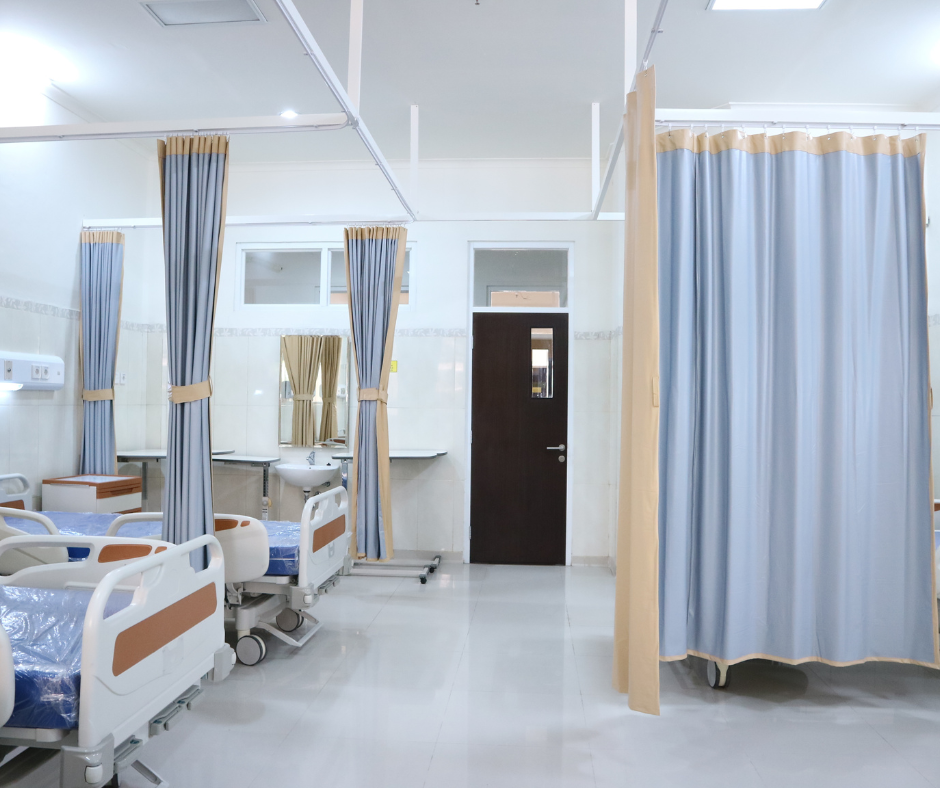Hospital staff left with life-changing conditions
 Workers at Bio Decontamination Limited attended Scarborough Hospital on 18 September 2019 after being hired to carry out the decontamination of the Aspen ward.
Workers at Bio Decontamination Limited attended Scarborough Hospital on 18 September 2019 after being hired to carry out the decontamination of the Aspen ward.
The company used ionised hydrogen peroxide to decontaminate the rooms in the ward. They failed to appropriately seal the rooms, meaning the ionised hydrogen peroxide escaped into the adjacent corridor where hospital staff were working.
It is a legal requirement to adequately control exposure to materials that cause ill health. How people can get exposed must be carefully considered. Guidance is available about what you need to do.
Three members of hospital staff required treatment at the Accident and Emergency department after being exposed to the substance. They suffered from itchy skin and became lightheaded. All three continue to suffer with life changing medical conditions as a result of their exposure and struggle to carry out day to day tasks or work
An investigation by the Health and Safety Executive (HSE) found that the work had not been properly risk assessed prior to being undertaken. The employees carrying out the work were not appropriately trained nor supervised and the working practices displayed was below the required standard. The level of ionised hydrogen peroxide was not adequately monitored to warn of release, exposing people to dangerous levels.
Read more on the HSM website.
Workplace wellbeing is for life – not just for January
 Workplace wellbeing is for life – not just for January. That’s the message to employers who are being encouraged to demonstrate their commitment to their staff.
Workplace wellbeing is for life – not just for January. That’s the message to employers who are being encouraged to demonstrate their commitment to their staff.
Employers are being asked to show their awareness that January is a time where employees take stock and make important life and career decisions, which can impact mental wellbeing.
GRiD, the industry body for the group risk sector, believe now is when employers need to be proactive in supporting the mental wellbeing of their staff.
Katharine Moxham, spokesperson for GRiD, said: “Many employers begin the new year very much focussed on their renewed ambitions for the business itself.
“However, it’s important to understand that employees may have also used the festive period to reassess their own lives and may return to work with additional plans and burdens.
“Blue Monday is a good reminder that employers need to be aware of the mental wellbeing of staff, but it’s important to remember that mental health support should be continual and not just for Blue Monday.
“Mental health is often discussed in a very socially acceptable manner but make no mistake, in the more severe cases, support is aimed at reducing the incidence of some very serious conditions.
“Not every employee will feel the pressure of Blue Monday or want to make significant changes to their lives in January, but employers need to be ready and waiting with meaningful support, for those who do.”
Learn more on the SHP website.
Partnership offers BSI employees menopause support
 Maven Clinic, the world’s largest virtual clinic for women and families, and BSI, the business improvement and standards company, have announced a partnership to provide BSI’s employees worldwide with access to industry-leading menopause support through Maven’s Menopause and Ongoing Care program.
Maven Clinic, the world’s largest virtual clinic for women and families, and BSI, the business improvement and standards company, have announced a partnership to provide BSI’s employees worldwide with access to industry-leading menopause support through Maven’s Menopause and Ongoing Care program.
Through Maven, BSI employees have 24/7 unlimited access to dedicated Care Advocates and menopause specialists—including OBGYNs, nutritionists, mental health providers, pelvic floor physical therapists, and career coaches—as well as clinically sound education and provider-moderated drop-in groups to support members throughout their journey. Virtual care with specialists across 35+ languages is available to members on-demand through video or message chat.
The partnership underscores BSI’s leadership and commitment to supporting employees as they navigate menopause. It follows the publication in May of a first-of-its-kind workplace standard menopause, menstrual health and menstruation in the workplace (BS 30416), available globally for free, which sets out straightforward changes designed to create a more inclusive and productive environment.
For more on the partnership, visit the HSM website.
58% of unsafe buildings yet to start remediation works, government data shows
 Data from the Department for Levelling Up, Housing and Communities’ (DLUHC) monthly remediation report, shows that 58% of buildings identified with unsafe cladding are yet to start remediation works.
Data from the Department for Levelling Up, Housing and Communities’ (DLUHC) monthly remediation report, shows that 58% of buildings identified with unsafe cladding are yet to start remediation works.
Published on 18 January 2024, the release highlighted that in December 2023, a total of 3,839 buildings had been identified with unsafe cladding, and of those, 1608 have started or finished remediation works.
The DLUHC said: “Overall, 1,608 buildings (42%) have either started or completed remediation works. Of these, 797 buildings (21%) have completed remediation works.
“This includes remediation progress on high rise (18m+) buildings in height, as well as further identified mid-rise (11-18m) in height.”
The report also stated that buildings reported to have started or completed works has doubled since December 2022.
Earlier this week, two landlords in Bristol were ordered to replace cladding deemed a fire safety risk at a five storey block of flats, after leaseholders filed remediation applications under the Building Safety Act.
Visit the SHP website to learn more.
To keep up to date with the latest health & safety news and advice, follow us on social media:
